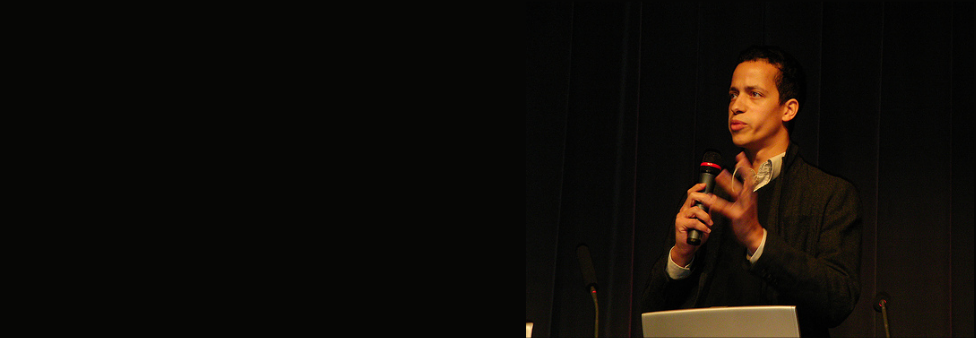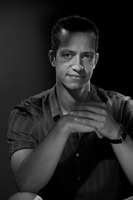De Franse webexpert Dominique Hazaël-Massieux (W3C) geeft op 2 april 2015 een masterclass over de huidige stand van zaken van WebRTC en 's avonds een workshop HTML5/webapps.

WebRTC – Web Real-Time Communications – is een relatief jonge maar snel aan belang winnende webstandaard, waarmee allerlei nieuwe vormen van realtime-communicatie via het Web mogelijk worden. Denk daarbij aan audio- en video-gesprekken, instant messaging en het uitwisselen van bestanden. De gebruiker hoeft geen extra (gesloten) software zoals Skype of iChat draaiende te hebben op zijn computer. Het is niet nodig om een account aan te maken, en al evenmin hoef je speciale toepassingen op je computer te installeren – webRTC werkt zonder verdere toevoegingen in daartoe geschikte browsers.
Wat daarbij met name interessant is, is dat het (in tegenstelling tot bestaande leverancier-afhankelijke commmunicatiekanalen) naadloos aansluit op de context van de eindgebruiker die zich beweegt over het World Wide Web. Op die manier kun je bijvoorbeeld als eigenaar van een website met één knop de dialoog aangaan met een bezoeker van je site, of je gebruikers onderling met elkaar laten praten. Je kunt webRTC als technologie door het gebruiksgemak natuurlijk ook in een besloten omgeving inzetten, bijvoorbeeld in de ouderenzorg of voor het organiseren van een ledenvergadering of politieke inspraak-avond.
Over de spreker
 Dominique Hazaël-Massieux. Foto: Yves Colas.
Dominique Hazaël-Massieux. Foto: Yves Colas.
Dominique Hazaël-Massieux is, als teamlid van het World Wide Web Consortium (W3C),W3C contactpersoon van de WebRTC Working Group, en stond mede aan de basis van het ontstaan van deze groep. Hij heeft een ingenieurstitel van de Ecole Centrale Paris, en was eerder onder meer verbonden aan MIT en INRIA. Hij ook W3C Activity Lead van het Mobile Web Initiative en team contact voor de WebMob Interest Group en de Device APIs Working Group, die als doel heeft om webapplicaties net zo krachtig te maken als traditionele ‘native’ applicaties. Meer informatie over de spreker: http://www.w3.org/People/Dom/.
De masterclass wordt van 14.00-17.00 uur gehouden bij het Centrum Wiskunde & Informatica (CWI) in Amsterdam, en wordt georganiseerd op uitnodiging van Internet Society Nederland en het W3C Benelux Office van het World Wide Web Consortium. Registreer op tijd, want vol = vol.
Deelname is gratis voor leden van W3C en ISOC.nl (na registratie) en 30 euro voor andere belangstellenden. Voertaal is Engels.
Registratie: http://isoc.nl/events/webrtc-masterclass
N.B. Diezelfde avond, dus ook op 2 april, organiseren ISOC en W3C een HTML5/webapps workshop in de Amsterdamse Waag Society. Het avondprogramma duurt van h20.00-20.30 uur. Alexander Blom, voorzitter ISOC.nl licht de inhoud toe: "HTML5 biedt een rijke set van features waar voorheen browser plug-ins benodigd waren. Denk hierbij aan embedded content als audio en video, maar ook aan zaken als locatiebepaling, client-side opslag en web sockets. Belangrijker nog is dat je met HTML5 niet meer per OS een aparte app te ontwikkelen. Tijdens de workshop zal Dominique vanuit zijn expertise als W3C working group deelnemer uitgebreid ingaan op de uitgebreide mogelijkheden van HTML5."
[English version]
W3C/ISOC Masterclass WebRTC
The French Web expert Dominique Hazaël-Massieux presents a masterclass on the current state of WebRTC at the Science Park Amsterdam on Thursday, 2 April 2015. The event starts at 14.00h and ends at 17.00h.
WebRTC – Web Real-Time Communications - is a relatively young Web protocol, which rapidly gains in importance, and with which many new forms of real-time communication via the Web become possible. Think of audio and video calls, instant messaging and exchanging files via the Web without the need to have additional (closed) software such as Skype or iChat on your computer. It is not necessary to create an account, nor do you need to install special applications on your computer - WebRTC works without further additions in thereto enabled browsers.
Particularly interesting is, that it fits (unlike existing supplier-dependent communication channels) seamlessly to the context of the end user moving across the World Wide Web. As a website owner you might then, for instance, be able to start a dialogue with a site visitor, or have your users communicating with each other. You can also deploy WebRTC, as an easy to use technology, in a private environment, such as in care for the elderly or for the organization of a membership meeting or political public participation event.
About the speaker
 Dominique Hazaël-Massieux. Picture: Yves Colas.
Dominique Hazaël-Massieux. Picture: Yves Colas.
Hazaël-Massieux is, as a Team Member of the World Wide Web Consortium (W3C), the team contact for the WebRTC Working Group, and stood at the base of the creation of this group, which aims at bringing peer-to-peer audio/video connections to the Web. He has an engineering degree from the Ecole Centrale Paris, and was previously also associated with MIT and INRIA. He is also W3C Activity Lead of the Mobile Web Initiative, and team contact for the WebMob Interest Group and the Device APIs Working Group, which aims to make Web applications as powerful as traditional “native” applications.
The master class will be held at the Centrum Wiskunde & Informatica (CWI) in Amsterdam, and is organized at the invitation of Internet Society Netherlands and the W3C Benelux Office of the World Wide Web Consortium. Register on time, as full = full.
Participation is free for W3C Members and members of ISOC.nl after registration. For other attendees there is a registration fee of 30 euro.<
Registration: http://isoc.nl/events/webrtc-masterclass
Note that at the evening of the same day, Dominique Hazael-Massieux gives a master class on another hot topic, namely ‘web apps’. Thanks to HTML5 you don’t have to build separate apps for each platform. Instead, you can develop platform-independent solutions that can be reused. [Read more]
More information on the speaker: http://www.w3.org/People/Dom/
